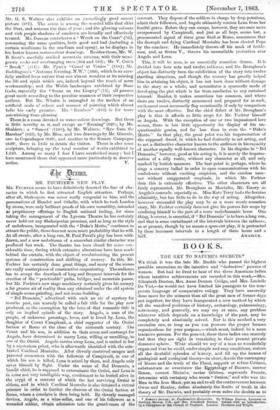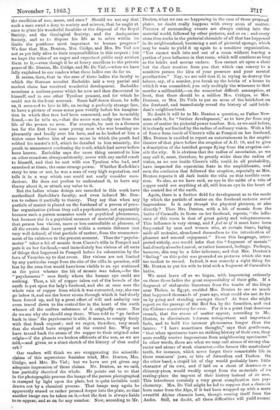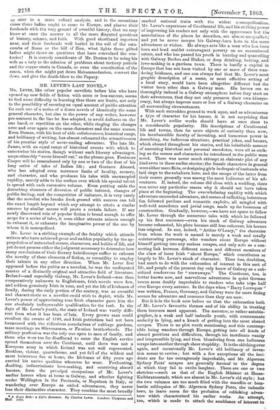BOOKS.
THE KEY TO NATURE'S SECRETS.* WE think it was the late Mr. Buckle who passed the highest possible encomium on the intuitive and "deductive" powers of women. But had he lived to hear of the three American ladies whose intuitive achievements are recorded in this work,—Mrs. Elizabeth Denton, Mrs. Anne Denton Cridge, and Mrs. Lucielle Do Viel,—he would not have limited his panegyric to the tem- perate language of comparative eulogy. They have assuredly done more for the sciences than all the great men of former days put together, for they have inaugurated a new method by which all the unsolved problems of history; arche=ology, palmontology, astronomy, and generally, we may say at once, any problem whatever which depends on a knowledge of the past, may be completely and absolutely solved. Nor is this method a very recondite one, so long as you can procure the proper human organizations for your purpose,—which must, indeed, be a mere tentative process. For the present, these three ladies cau scarcely feel that they are right in remaining in their present private domestic sphere. What should we say of a man so wonderfully organized that he could, under simple and easy conditions, restore all the doubtful episodes of history, and fill up the lacuna: of geological and zoological theory—in short, decide the cosmogony of Moses and the truth of the Flood, support or refute Colenso, substantiate or overthrow the Egyptology of Bunsen, answer Renan, correct Niebuhr, revise Gibbon, supersede Fronde, determine with certainty who wrote " Junius," and who was the Man in the Iron Mask, put an end to all the controversies between Owen and Huxley, define absolutely the limits of truth in the theory of Mr. Darwin, and probably even solve the doubts as to
* Nature's Secrets; or, Psychometric Researches. By William Denton, Lecturer on Geology, Boston, U.S., and 2dra. Elizabeth Denton. Edited, with an introduction, by a Clergyman of the Church of England. London : Holliston and Wright.
the condition of sun, moon, and stars ? Should we not say that such a man owed a duty to society and science, that he ought at once to place his wonderful faculties at the disposal of the Royal Society, and the Geological Society, and the Antiquarian Society, and so to dispose his life as to solve within its limits the problems most important to human progress? We fear that Mrs. Denton, Mrs. Cridge, and Mrs. Do Viel are not as yet fully alive to their responsibilities in this respect ; but we hope the voice of an eager and expectant public may awaken them to it,—even though it be at heavy sacrifices to the private peace of Mr. Denton, Mr. Cridge, and Mr. Do Viel,—when we have fully explained to our readers what these ladies can do for us.
It seems, then, that in the ease of these ladies the faculty to which the German novelist Zschokke laid a very partial and modest claim has received wonderful development. Zschokke mentions a curious power which he now and then discovered in himself, and iu one other Tyrolese peasant, and for which he could not in the least account. Some half-dozen times, he tells ns, it occurred to him in life, on seeing a perfectly strange face, to have a picture of some scene pass vividly before his imagina- tion in which that face had been concerned, and he invariably found,—so he tells U3, —that the scene was really one from the life of the person so seen. For example, he met in a German inn for the first time some young man who was boasting un- pleasantly and loudly over his beer, and as he looked at him a vision came before him of some scene in which the youth had robbed his master's till, which he detailed to him minutely, the youth in amazement confessing the truth, th, which had never before been known. Zschokke says the same thing occurred to him on other occasions, always arbitrarily, never with any useful result to himself, and that be met with one Tyrolese who had, and exercised at times, the same strange power. Whether Zschokke's story be true or not, he was a man of very high reputation, and tells it in a way which one could not easily consider men- dacious. He does not pr•ofess to understand it, to have any theory about it, or attach any value to it.
But the ladies whose doings are recorded in this work have methodized Zschokke's faculty; and even induced Mr. Den- ton to reduce it partially to theory. They say that when any particle of matter is placed on the forehead of a person of pecu- liar organization (whom they call a psychometer, not apparently because such a person measures souls or psychical phenomena, but because she is a psychical measure of material phenomena), that person has visions, more or less controllable at pleasure, of all the events that have passed within a certain distance (not very well defined) of that particle of matter, from the commence- ment of its existence to the present moment. Thus the " psycho- meter" takes a bit of mosaic from Cicero's villa in Pompeii and puts it on her forehead,—and immediately has visions of all sorts of things that happened in Pompeii before its submersion by the lava of Vesuvius up to that event. Her visions ar•e not limited by any particular range from the site of the villa in question, still less by the area that would have been visible to an eye stationed at the point whence the bit of mosaic was taken,—for the " paychometer " sees freely where the human eye could see nothing. Thus, a bit of copper taken out of the bowels of the earth is put upon the lady's forehead, and she at once sees the whole vein of copper from which it was extracted, nay, she can go below it, and see the lower strata through which it had slowly been forced up, and by a great effort of will and audacity can even travel down to the central fire in the heart of the earth whence all the molten substance. of it originally came. Nor do we see why she should stop there. When told to "go further back in time" the psychometer• is able, it seems, to comply freely with that frank request ; and we regret, therefore, very much that she should have stopped at the central fire. Why not have traced back the atoms of the copper to their original solar origin—if the planets are broken offshoots of the sun, as we are told,—and given. us a short sketch of the history of that useful orb ?
Our readers will think we are exaggerating the scientific claims of this mysterious feminine triad, Mrs. Denton, Mrs.
Cridge, and Mrs. Do Viel ; but we have not yet given any
adequate impression of those claims. Mr. Denton, as we said, has partially theorized the whole. He points out to us that
in the photographic process the image of the person photographed is stamped by light upon the plate, but is quite invisible until drawn out by a chemical process. That image may again be apparently erased or rather pressed deeper into the plate, so that another image can be taken on it,—but the first is always liable to re-appear, and so on for any number. Now, according to Mr.
Denton, what we can see happening in the case of those prepared plates, no doubt really happens with every atom of matter. Pictures of surrounding events are always sinking into the material world, followed by other pictures, and so on ; and every atom thus sucks in the pictorial chronicle of all that has happened in its neighbourhood, becoming a sort of pictorial sponge, which may be made to yield it up again to a sensitive organization. "You cannot walk into and out of a room without leaving a portion of your influence in that room, which will continue as long as the bricks and mortar endure. You cannot sit upon a chair but the chair receives from you that which can convey to a sensitive person the idea of your presence and your mental peculiarities." Nay, we are told that if, in trying to destroy the tokens, say, of a murder, you break up the bricks of a house in which it was committed, you only multiply the witnesses to that murder a millionfold,—on the somewhat difficult assumption, at least, that there should be a million Mrs. Cridges, or Mrs. Dentons, or Mrs. Do Viels to put an atom of the brickdust on the forehead, and immediately reveal the history of said brick- dust's neighbourhood.
No doubt it will be to Mr. Denton a question, as Father New- man calls it, for "further development," as to how far from any atom of matter• its pictorial power reaches. But, as we said before, it is clearly not limited by the radius of ordinary vision. With a bit of fresco from inside of Cicero's villa at Pompeii on her forehead, Mrs. Denton is enabled to report an entertainment in the amphi- theatre of that place before the eruption of A.D. 79, and to give a description of the terrified groups flying from the eruption out- side the city. It is obvious that the radius of association, as we may call it, must, therefore, be greatly wider than the radius of vision, as no one inside Cicero's villa could, in all probability, have inspected the equestrian feats in the amphitheatre, and seen the confusion that followed the eruption, especially as Mrs. Denton reports it all dark inside the villa on that terrible occa- sion. So also, as we have said, no eye in the midst of a vein of copper could see anything at all, still less an eye in the heart of the central fire of the earth.
Again, there is a further field for development as to the mode by which the particle of matter on the forehead restores moral impressions. Is it only through the physical pictures, or also directly? Thus Mrs. Denton, with a bit of mosaic from the baths of Caracalla in Rome on her forehead, reports, " the influ- ence of this room is that of great gaiety and voluptuousness. This influence is very strong, and I feel as if it must have been frequented by men and women who, at certain times, laying aside all restraint, abandoned themselves to the intoxication of pleasure and sensual enjoyment." From this language, inter- preted strictly, one would infer that the "fragment of mosaic" had directly absorbed moral, or rather immoral, feelings. Perhaps, however, this may be a false inference, and that Mrs. Denton's "feeling" on this point was grounded on pictures which she was too modest to record. Indeed, it was scarcely a right thing for Mr. Denton to put his wife to trial with a fragment of Caracalla's baths.
We must leave off as we began, with impressing seriously on these three ladies the great responsibility of their gifts. If a fragment of stalagmite limestone from the tombs of the kings near Thebes, in Egypt, enabled Mrs. Denton to see so much that happened thousands of years ago, what could she not do for us by going and standing amongst them? At Suez she might report on the passage of the Red Sea by the Israelites, and end the Colenso controversy for ever. For it is a point that deserves
remark, that the atoms of matter appear, according to Mr. Denton, to discriminate between unimportant and important
facts, and to hold the intenser phenomena longer than the fainter. " I have sometimes thought," says that gentleman, "that when specimens have no striking history of their own, they more readily receive impressions from neighbouring specimens." In other words, there are what we may call atoms of strong cha- racter and atoms of weak character,—the former like mastodons' teeth, for instance, which never forget their remarkable life in those creatures' jaws, or bits of Jerusalem and Thebes. On the other hand, a stupid bit of clay would probably have little character of its own, and if laid on a chest of drawers or a
chimney-piece, would weakly accept from the materials of its resting-place the impress of their history instead of its own.
This introduces certainly a very great complication into psy- chometry. Mrs. Da Viel might be led to suppose that a chamois horn came from the Alps, if it had been wrapped up with a more eventful Alpine chamois horn, though coming itself from the Andes. Still, no doubt, all these difficulties will yield sooner or later to a more refiner analysis, and in the meantime these three ladies ought to come to Europe, and plaster their foreheads with the very ground of eventful history, that we may know at once the answer to all the more disputed questions of history, science, and faith. With good shorthand reporters near, and their foreheads well buried in the soil of the cata- combs of Rome or the hill of Zion, what lights these gifted ladies might throw on questions that have convulsed the cen- turies ! It is scarcely considerate of Mr. Denton to be using his wife as a help to the solution of problems about tertiary periods and the copper strata in Canada, or even the constitution of the moon, when she might put down Mohammedanism, convert the Jews, and give the death-blow to the Papacy.
































 Previous page
Previous page